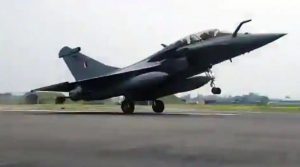The second batch of the Indian Air Force’s three Rafale fighter jets will arrive at the Jamnagar airbase in Gujarat directly from France on Wednesday as the air force prepares to form its first Rafale squadron at Ambala, officials familiar with the developments said on Tuesday.
The first batch of five Rafale jets of the 36 ordered by the IAF reached the Ambala airbase on July 29 after a stopover at the Al Dhafra airbase near Abu Dhabi, although a formal induction ceremony took place later on September 10.

“The three jets will not have a stopover on their way. They will be refueled by French and Indian tankers during the journey. The jets are expected to reach Ambala after a one-day break at Jamnagar,” the officials said.
An Indian Air Force team, led by a two-star officer, was in France last month to review the progress of the Rafale project ahead of the arrival of the second batch of fighters, as reported by Hindustan Times on October 16. The arrival of more fighters will further boost the IAF’s capability to rapidly deploy the advanced jets amid tensions with neighbouring China and Pakistan, the officials said.
The IAF is expecting three to four Rafale jets being delivered every two months, with all the 36 planes likely to join the air force’s combat fleet by the year-end.
The Rafale fighters — the first imported jets to be inducted into the IAF in 23 years after the Russian Sukhoi-30 jets entered service in June 1997 — have significantly enhanced the offensive capabilities of the IAF.
The IAF is operating the Rafale fighter jets in the Ladakh theatre where the military is on high alert to deal with any provocation by China at a time when talks have failed to reduce friction in the sensitive theatre.
IAF chief Air Chief Marshal RKS Bhadauria last month said the integration of Rafale fighter jets brought in a platform armed with advanced weapons, sensors and technologies that gave the IAF an operational and technological edge.
The jets were ordered from France in September 2016 under a government-to-government deal worth ₹59,000 crore. India-specific enhancements on the Rafales include a helmet-mounted sight, radar warning receivers, flight data recorders with storage for 10 hours of data, infrared search and track systems, jammers, cold engine start capability to operate from high-altitude bases and towed decoys to ward off incoming missiles.
The twin-engine jet is capable of carrying out a variety of missions – ground and sea attack, air defence and air superiority, reconnaissance and nuclear strike deterrence. It can carry almost 10 tonnes of weapons.